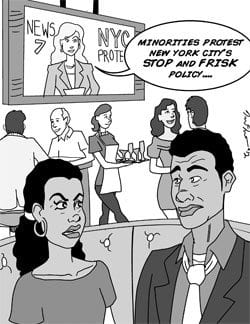
The wages of war
Celebration of the nation’s birth inspires awe about America’s vast growth and development. In 1800, the country’s population was only 5,308,483 (not counting Native Americans). There were 893,602 slaves. If the total U.S. population of that time lived in today’s New York, the city would suffer from countless apartment vacancies.
In a mere 236 years, the United States has become the world’s richest nation and the exemplar of freedom and democracy. It now appears that Americans of European descent disproportionately control the nation’s wealth and African Americans are still struggling to realize the “self-evident” truths “that all men are created equal, that they are endowed by their Creator with certain unalienable Rights, that among these are Life, Liberty and the pursuit of Happiness.”
While whites have been free to pursue the “American dream,” blacks have had to struggle for their freedom. The first phase was to outlaw slavery, which left blacks stateless and with no legal standing as human beings before the courts. In 1865, the 13th Amendment to the U.S. Constitution legally ended slavery, and three years later the 14th Amendment established that former slaves born in the U.S. were citizens.
The history of African Americans would have been quite different if the provisions of those constitutional amendments had been faithfully observed. However, they created a political shift which those in power were not about to tolerate. In many counties in the South, freed slaves outnumbered whites and would control the political structure if allowed to vote. Plantation owners and industrialists still needed low-cost labor in order to operate profitably.
Poll taxes, extreme literacy requirements and ultimately violence kept blacks from being registered to vote. Indigent black men were arrested and jailed for vagrancy. In a quasi-slavery mode, these prisoners were leased for the duration of their sentences to planters and factory owners.
Jim Crow laws throughout the South and elsewhere established a pattern of racial discrimination against blacks. In 1896, the U.S. Supreme Court in the case of Plessy v. Ferguson established the doctrine of “separate but equal” that sanctioned racial segregation. This remained the law of the land until it was overruled in 1954 in the case of Brown v. Board of Education. Even so, it took the Civil Rights Act of 1964 to outlaw throughout the country racial discrimination in employment, education and places of public accommodation.
From before 1776 until passage of the Voting Rights Act of 1965 blacks in America were involved in a sustained battle for their freedom and an end to racial discrimination. For an exceedingly long period of time, as this conflict raged, black leaders spent too little time and attention on sustaining those cultural values crucial to blacks and necessary for their progress in peace time.
From the black perspective, this protracted conflict was the equivalent of war, and a major casualty was the stability of the black family. Sociologists have commented extensively on how and why black family values deteriorated. Presently, about 72 percent of black children are born out of wedlock. Children of these fatherless homes account for an equivalent number of high school dropouts, children in prison and those afflicted with drug problems.
To a great extent, these families and these children are the casualties of a race war that has been raging for generations. It is time for black leaders to focus on this post-traumatic stress disorder (PTSD) that has eroded black progress toward full equality.






